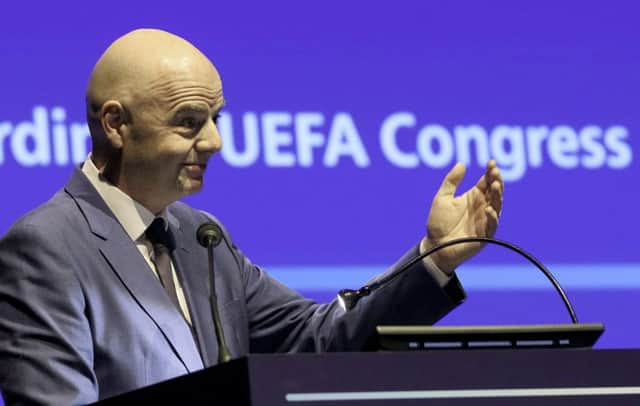VAR expected to be used at this year's World Cup


IFAB – made up of the four home nations and Fifa – had reportedly been split going into their ground-breaking meeting in Zurich over whether the time was right to introduce video assistant referees especially after Uefa president Aleksander Ceferin’s insistence that it was too early to use them in the Champions League next season.
Such was the overwhelming evidence presented to IFAB by a group of technical experts that VARs could only improve the game and reduce “clear and obvious” errors that IFAB turned two years of experimentation into law without any objections.
Advertisement
Hide AdAdvertisement
Hide AdOfficials were won over by statistics from around 1,000 matches which showed officiating accuracy had increased from 93 per cent to almost 99 per cent.
That was considered of greater significance than the teething troubles that have marred the use of VARs in Britain, notably flawed interpretations, long delays and lack of communication with players, managers and spectators.
Fifa president Gianni Infantino, who has led the drive for VARs to be implemented, said the decision to use them at the World Cup will be rubber-stamped at a meeting of the ruling Fifa Council on 16 March.
“As of today, video assistant refereeing is part of football,” he said. “We hope and encourage a favourable decision.”
Yesterday’s ruling was made after IFAB was presented with the results of independent analysis conducted by Belgian university KU Leuven. “I would say to the fans, players and coaches that it will have a positive impact,” said Infantino. “ It’s almost perfect.”
The British federations expressed their satisfaction even though VARs have proved highly contentious in some of the cup games in which the system has been trialled.
“I’m not ignoring criticism but we’ve only had ten games so far, most of which have passed without any comment at all,” said the English FA’s chief executive Martin Glenn. “It’s clearly a learning curve and we all agree there is more work to be done. We need more experience to get the quality that, say, Italy and Germany have seen.”
Glenn nevertheless identified three specific areas that needed improvement. “We have to speed up reviews, communication to the crowd has to be better and we need to be much more comfortable with what are clear and obvious errors. It’s clearly a learning curve but it’s very compelling.”
Advertisement
Hide AdAdvertisement
Hide AdVideo reviews can only cover four areas: disputed goals, penalty awards, red cards and mistaken identity. With Fifa holding half of IFAB votes and the four British associations one each, it would have needed six votes to pass into law the most far-reaching rule change since goalline technology. In the end the decision was unanimous, though Welsh FA chief executive Jonathan Ford admitted that he had been “sceptical”.
Ford said he had been won over by statistics which showed that a serious refereeing mistake occurred in one in three matches before VAR but in one in 19 games in countries where it has been trialled.
Infantino rejected the argument out forward by his predecessor Sepp Blatter and others that Fifa was being too hasty. “We have to be as close to perfection as possible and VAR gets us closer,” he said. “For years Fifa and IFAB were criticised for being too slow. But if we can help referees correct mistakes that naturally occur on the pitch, we will have taken a great step.”
One of the VAR concerns is that those watching are uncertain about what is going on, but Fifa is working on a rugby and cricket-style system.
“What is our idea (for the World Cup) is that after the final decision is taken by the referee on the pitch we would like to show in the stadium the selected replay that was used by the referee and the VAR outcome,” said Johannes Holzmuller, head of Fifa football technology innovation.
IFAB technical director and former World Cup referee David Elleray said all stakeholders had to be patient and allow teething troubles to be ironed out. “A trial by its necessity involves trial and error,” Elleray stressed. “Our strapline has always been minimum interference, maximum benefit. We believe the system is delivering and that significant progress is being made.”